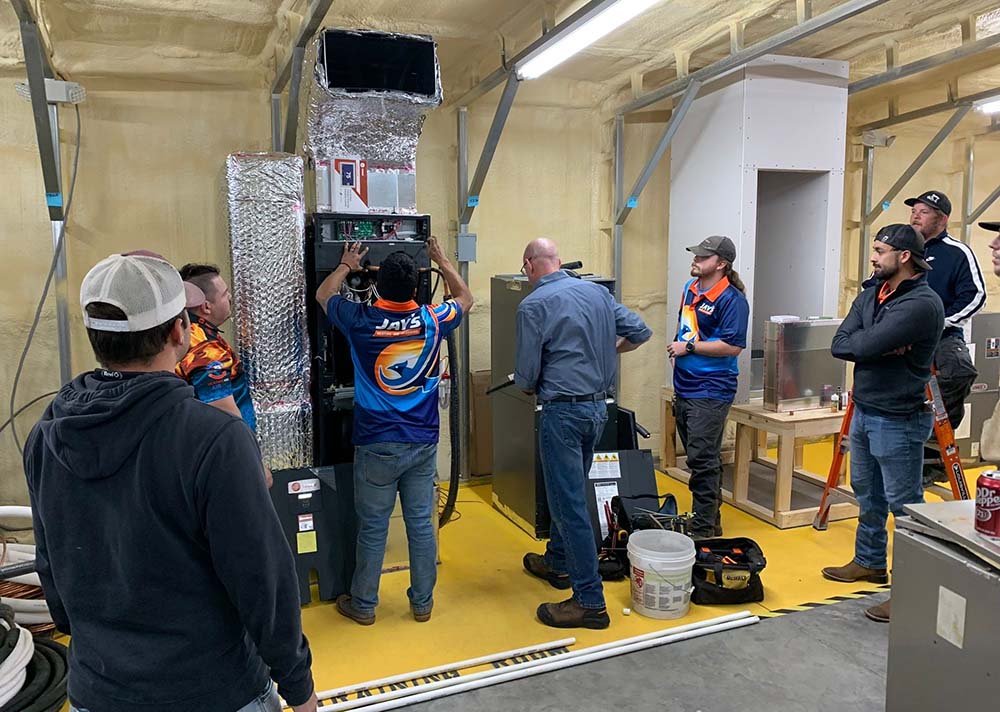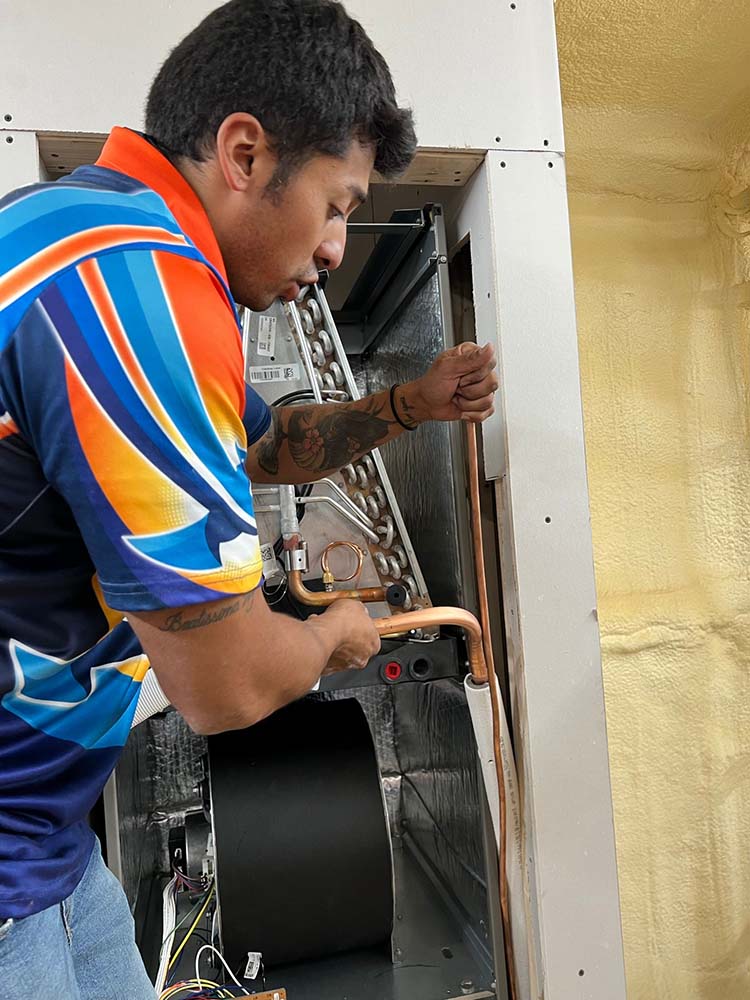HVACR technician training is the key to any successful HVACR company. It also requires buy-in, and that can mean anything from suggesting particular courses to encouraging training through incentives like bonuses. The payoff? Employee retention, employee satisfaction, and happy customers.
Techs who keep their skills sharp through training will almost inevitably progress in their career and generate more money for both themselves and the contractor. However, in order for technician training to really succeed, it has to extend past the mechanical side of things and into customer service.
head profit coach
Business Development Resources (BDR)
Why Train?
The type of training a technician has usually directly coincides with how much money they make and what point they are at in their career. As a technician adds skills to their repertoire, their value as an employee increases, and they’re usually able to generate more revenue for the contractor. So if a technician is looking to move up the ladder and make more money, training is a great way to do so.

ONSITE: NexTech Academy technical coach Joe DeLong was onsite this fall to help with some onsite HVAC training at J’s HVAC Unlimited in Surry County, North Carolina. (Courtesy of J’s HVAC Unlimited)
“[Training] allows them to kind of escalate their own income and create more opportunities in terms of job promotions and potentially commission structures, depending on how the contractor has organized your wage progression,” said Joel Ellingson, director of NexTech Academy team.
Jasen Laws, head profit coach, Business Development Resources (BDR), noted that for contractors, actively seeking ways to invest in their technicians’ future — and communicating that — is one of the biggest keys to retention. People prefer to work for a company that invests in them long-term.
“I believe training and development may honestly be more powerful than wages themselves,” Laws said.
When a contractor is willing to invest in their people, it shows that they not only understand the value of people, but that the industry in which they serve is people-centric.
Ellingson said if he were a technician, he’d spend most of his time evaluating the contractors he wanted to work for through how they planned to support his skill development path as a technician.
“Because they communicate so many different things with the manner in which they do that,” he said. “They communicate how much they care about the technician as an individual, because a more skilled technician equals a more valuable technician, more capable of providing for themselves and their family.”
As a plus, this tends to attract the types of technicians who view their work as a career, not just a job.
Technician training is also necessary for extraordinary customer service, since the employees sent into customers’ homes end up being the “face” of the company.
“We have to remember that the experience they provide to that client will probably play the most significant role in how the client feels about our company, and what ultimately becomes our reputation in the marketplace,” said Jason Carroll, president of P1 Service Group. “And so when you think about it that way, I think it's fair to say that training is one of the most critical factors to the success of our companies.”
Training with Intention
With a vast array of training options available, technicians need to be guided toward what options benefit their skillsets and goals, or chances are they may not to participate at all. Contractors can guide and encourage technician training and certification through providing prescriptive options for technicians.

TECH TRAIN: Dealing with everyday technician challenges at an onsite training (Courtesy of J’s HVAC Unlimited)
“The key for any contractor that wants to support the process of skill development for new technicians is understanding that developing a competent, engaged, customer-focused workforce, requires an approach that's systematic,” Ellingson said. “You have to make sure you've got facilitated curriculum, skill practice, field mentorship, reward-based skill objectives … and help communicate to the technician that this is how you’re going to help them build their skill. Then you've also got to have a safe practice space so when the technician comes back from a rough day where something didn’t go well, they've got a place where they can go without a customer nearby.”
Carroll said contractors have to first have written, repeatable processes in place for the technicians to follow when it comes to the mechanical training, product training, and customer service training. If the technician isn’t proficient in all three areas, they won’t provide a five-star experience to the client.
Contractors can also help encourage technicians to want to keep their skills sharp through incentivizing them for completing trainings.
“We have to regularly motivate the behaviors we’re looking for,” Carroll said. It could be something small, like recognizing when good work is done, or through raises or bonuses, extra time off, and promotions — things that remind technicians how important the work they do is, and why they should want to invest in it more.
“It’s a team sport. You have to have a plan, you have to be intentional about what you're designing and what you're trying to reward and incentivize,” Ellingson said.
At BDR, as a technician increases in pay because of their certifications, their title increases as well.
“It's also the increase of level and status within the organization. As we grow in our careers, we want the recognition that comes along with it as well,” Laws said.
While Ellingson agrees with rewarding any activity that engages a technician’s desire to gain more skills, he cautions that the customer experience should be emphasized as well.
“You don't want people running off acquiring a bunch of skills, getting rewarded for that, and then creating three-star review experiences for customers,” he said. “The message should be: We value your skill development and we would like to reward you for investing in yourself while protecting our reputation with our customers.”
Training Time
Done right, online training can be a great supplement to in-person learning — especially for an industry like the HVACR industry, when work can be seasonal.
“If you can use virtual training for some of your trainings to keep your technicians more efficient and to make training more realistic in your organization, then I think it's totally worthwhile,” Carroll said.
The availability to incentivize technicians into taking the training initiative themselves has increased as the online options have, Laws said. But a lot of technicians are still going to need motivation.
“When they get home from work, do they really want to do this on their own time? There needs to be an additional incentive in order to get them to go through those training modules,” Laws said.
If contractors are willing, the best option to encourage technician participation and desire to get certified may be offering those training courses during their normal work week. In fact, it’d be perfectly reasonable to carve out a specific amount of time — every week — for technicians to train and work on their skills.
“We don't train enough in our industry. It should become part of our industry culture to carve out time regularly for techs to do these things,” Laws said. “We need to be investing two hours a week minimum to training, all year long.”
Think of everything a technician could possibly be trained on: each applicable product available, all the different types of mechanical systems, and then the customer service piece — it’s a lot.
“I think in order to accomplish this end result we really need to be intentional about creating those outcomes,” Carroll said. “If we do that over time, we're growing every single week. We're getting better every single week. And I think that's what we should all strive to be doing: just getting a little bit better every single week.”



Report Abusive Comment